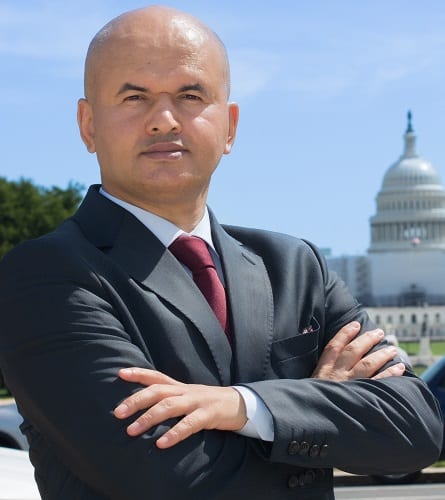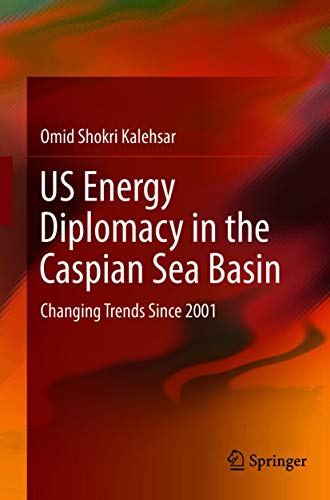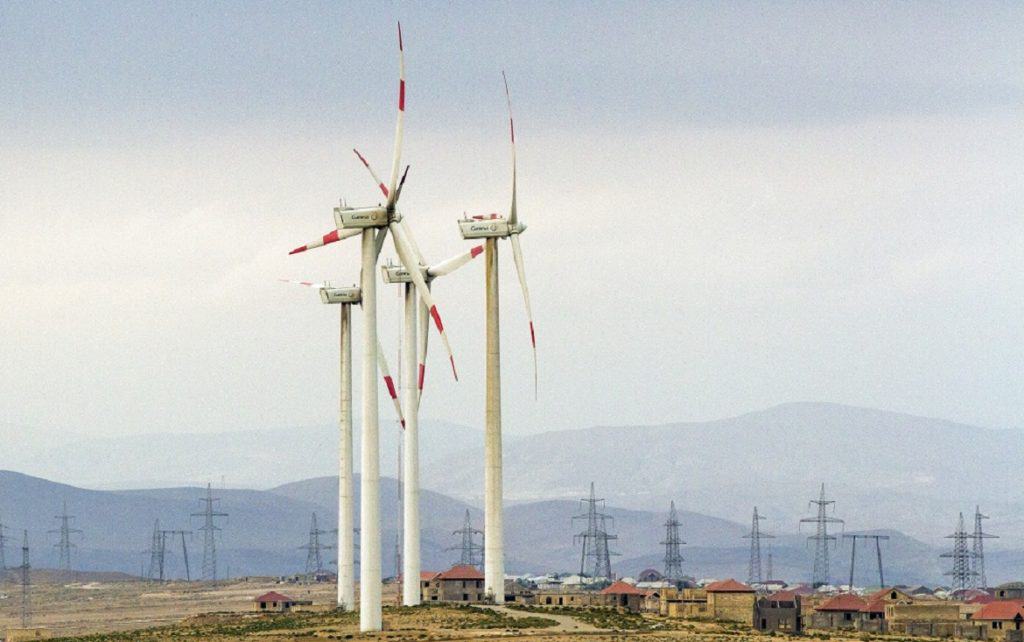World Geostrategic interview with Dr. Umud Shokri on the prospects of the strategic partnership agreement signed by Azerbaijan, Georgia, Romania, and Hungary to build a submarine power plant for Black Sea energy; the potential risks and challenges associated with increased European energy dependence on Azerbaijan; the potential for green energy development in Turkmenistan; and the major energy-related strategic interests of the United States in the Caspian region.

Dr. Umud Shokri is an accomplished energy strategist and foreign policy advisor, with a track record of designing sustainable energy solutions for public and private sector clients around the world. He has extensive experience in clean energy policy formulation, and environmental impact assessment. He is author of the book “US Energy Diplomacy in the Caspian Sea Basin: Changing Trends Since 2001“, He is currently serving as a senior visiting fellow at George Mason University. Shokri has advised corporate clients and governments on their energy transition strategi
Q1 – On Dec. 17, 2022, Azerbaijan, Georgia, Romania, and Hungary signed a strategic partnership agreement to build a Black Sea Energy undersea power cable with a capacity of 1,000 MW and a length of 1,195 km. The cable will be designed to supply “green” electricity generated in Azerbaijan, via Georgia and the Black Sea, to Romania for subsequent transmission to Hungary and the rest of Europe. The project is currently in the development phase of a feasibility study, which is expected to be completed in September 2023, while construction of the cable will take 3-4 years. This project “will help Europe strengthen the security of energy supply,” said Ursula von der Leyen, president of the European Commission, which plans to allocate 2.3 billion euros to lay the cable, the longest in the world. What is your opinion on the effective capacity of such a project and its foreseeable impact and development?
A1 – The strategic partnership agreement signed by Azerbaijan, Georgia, Romania, and Hungary to build a Black Sea Energy undersea power cable is a significant initiative with the potential to impact the energy landscape in Europe. While I can provide an analysis based on the information you provided, it’s important to note that specific details and outcomes can vary as the project progresses.
Effective Capacity
With a capacity of 1,000 MW, the undersea power cable has the potential to transmit a substantial amount of electricity. It can contribute to the diversification of energy sources in Europe and increase the share of “green” electricity in the overall energy mix. However, the effective capacity will depend on various factors, including the availability of renewable energy generation in Azerbaijan, the efficiency of transmission, and the infrastructure capacity of receiving countries.
Foreseeable Impact and Development
Enhanced Energy Security: The project can contribute to strengthening Europe’s energy security by diversifying energy sources and reducing dependence on a single supplier. It can also provide an additional route for renewable energy transmission, which is in line with Europe’s transition towards cleaner energy.
Economic Benefits: The project has the potential to stimulate economic growth and job creation in the participating countries. It can encourage investments in renewable energy infrastructure and promote technological advancements in the energy sector.
Regional Cooperation: The strategic partnership among Azerbaijan, Georgia, Romania, and Hungary demonstrates regional cooperation in the energy sector. It sets a precedent for collaboration in the Black Sea region and can lead to further joint initiatives in the future.
Technical and Environmental Challenges: The construction of an undersea power cable of such length and capacity presents technical and environmental challenges. The feasibility study will assess these aspects, including the optimal route, environmental impact, and necessary infrastructure upgrades. Addressing these challenges effectively will be crucial for the successful implementation of the project.
Regulatory and Policy Considerations: The project will require coordination among multiple countries and regulatory frameworks. Ensuring favorable policies, regulatory stability, and efficient cross-border energy trade will be important to maximize the project’s impact.
As the project progresses from the feasibility study to construction, further assessments and evaluations will provide more accurate insights into its potential capacity, challenges, and impact.
Q2 – Azerbaijan is estimated to have the potential to produce 200 gigawatts of green energy, 25 times more than the energy capacity currently installed in the country. A significant amount of this green energy is expected to be produced in Karabakh. In fact, the high share of territories regained in 2020 as a result of the victory in the conflict with Armenia provides Baku with significant additional resources in wind energy. The European Union claims it can emancipate itself from Russian energy through greater cooperation and imports from Azerbaijan. However, there are some dissenting voices. There are those who point out that the EU underestimates the risk of corruption in Azerbaijan’s energy sector, and that in any case it is unwise to replace energy dependence on Vladimir Putin’s oppressive and belligerent regime with an increasing dependence on authoritarian and belligerent Azerbaijan. What is your opinion?
A2- The potential for Azerbaijan to produce 200 gigawatts of green energy, including wind energy resources in Karabakh, represents a significant opportunity for the country’s energy sector. Expanding renewable energy capacity can contribute to Azerbaijan’s economic development and support its transition to a more sustainable energy system.
Regarding the European Union’s interest in diversifying its energy sources and reducing dependence on Russian energy, cooperation and imports from Azerbaijan are seen as potential alternatives. However, it is important to consider the potential risks and challenges associated with such dependence.
Corruption Concerns: Corruption can pose a significant risk to the energy sector, as it can undermine transparency, efficiency, and fair competition. If corruption is prevalent in Azerbaijan’s energy sector, it can affect the reliability and credibility of energy projects and partnerships.
Human Rights and Authoritarianism: Some critics argue that increasing dependence on Azerbaijan’s energy resources could potentially align the EU with an authoritarian regime. Concerns related to human rights, freedom of speech, and democracy in Azerbaijan have been raised by various international organizations. It is essential for the EU to consider these factors in its energy cooperation.
Geopolitical Considerations: Dependence on any single country or region for energy resources can create geopolitical vulnerabilities. While reducing dependence on Russian energy is a valid goal, it is crucial to assess the potential risks and diversify energy sources to avoid transferring dependence from one region to another.
In considering energy partnerships and cooperation, it is important for the European Union to conduct thorough assessments, including evaluating governance, transparency, and human rights issues in Azerbaijan. Building robust governance frameworks, promoting transparency, and fostering dialogue on human rights concerns can help mitigate risks and ensure sustainable and responsible energy cooperation.
Ultimately, the decision on energy partnerships and import sources involves balancing various factors, including energy security, geopolitical considerations, human rights, and sustainability goals.
Q3 – Not only Azerbaijan, there is also huge potential for “green energy” development on the other side of the Caspian Sea. Turkmenistan is 5.6 times larger than Azerbaijan in terms of territory. Up to 70% of its territory is occupied by desert, an ideal place for solar energy production. The country does not seem to show political interest in developing alternative energy. However, an artificial lake called Altyn Asyr is under construction in northern Turkmenistan, east of Kara-Bogaz-Gol, at the junction of Balanabad and Dashoguz oblasts. The complete filling of this lake will be completed in 2025, with the inclusion of projects related to “green energy” development. What is your opinion? It is possible that Turkmenistan will use Azerbaijan’s experience and open up to “green energy” development. Indeed, by connecting the entire region with Europe, a green energy corridor may open up great opportunities for all the countries in the region. So, could Turkmenistan join Azerbaijan, Georgia, Romania, and Hungary in the project aimed at supplying green energy to Europe?
A3- The potential for green energy development in Turkmenistan, particularly in terms of solar energy due to its large desert areas, is indeed significant. Expanding renewable energy capacity in Turkmenistan could contribute to the country’s energy diversification, economic development, and environmental sustainability.
While Turkmenistan may not have shown explicit political interest in developing alternative energy, the construction of the Altyn Asyr lake and the inclusion of “green energy” development projects indicate a potential shift in focus. The completion of the lake in 2025, along with the associated projects, presents an opportunity for Turkmenistan to explore and harness its renewable energy potential.
In terms of collaboration, Turkmenistan could potentially join Azerbaijan, Georgia, Romania, and Hungary in the project aimed at supplying green energy to Europe. The establishment of a green energy corridor that connects the entire region with Europe could indeed provide significant opportunities for all the countries involved.
Cooperation among these countries would not only enhance their energy security but also contribute to the broader goal of transitioning to cleaner energy sources. Turkmenistan’s inclusion in such a project could leverage its renewable energy resources and allow for the efficient transmission of green energy to Europe.
However, it’s important to note that the decision to join such a project would depend on various factors, including political will, economic feasibility, infrastructure requirements, and the willingness of all parties to collaborate effectively. Additionally, there may be geopolitical considerations and logistical challenges that need to be addressed.
Overall, while Turkmenistan’s potential involvement in the project is speculative at this point, the development of a green energy corridor in the region could open up opportunities for collaboration and the expansion of renewable energy in Turkmenistan and neighboring countries.
Q4 – On April 3, the Ministry of Energy and AZPROMO organized the Azerbaijani-American Green Energy Forum. During the meeting there was an exchange of views on the expansion of U.S.-Azerbaijani relations in the field of “green energy” and other issues of mutual interest. You are the author of the book “US Energy Diplomacy in the Caspian Sea Basin: Changing Trends Since 2001.” What are currently the main U.S. strategic interests in the Caspian region related to energy?
A4- Diversification of Energy Supplies: The United States has a strategic interest in promoting energy diversification to reduce dependence on a single region or supplier. The Caspian region, with its significant oil and gas reserves, offers an opportunity to access alternative energy sources and increase global energy security.
Geopolitical Considerations: The Caspian Sea region holds geopolitical significance due to its location between Europe, Asia, and the Middle East. The United States has strategic interests in maintaining stability and influence in the region, which includes energy resources and transportation routes.
Energy Security: Ensuring the stability and security of energy resources is crucial for the United States. The Caspian region, particularly Azerbaijan and Kazakhstan, provides potential alternative sources of oil and gas that can contribute to global energy security.
Promotion of Market-Oriented Policies: The United States supports market-oriented policies and the development of transparent, efficient, and competitive energy sectors. Encouraging reforms in the Caspian countries’ energy sectors aligns with the U.S. interest in fostering open markets, attracting investments, and enhancing business opportunities for American companies.
Counterbalancing Russian Influence: The Caspian region holds strategic importance in terms of counterbalancing Russian influence in the energy sector. The United States has sought to diversify energy supplies and transportation routes to reduce Europe’s dependence on Russian energy, and the Caspian region plays a role in achieving this objective.
It’s important to note that strategic interests can evolve over time due to changing geopolitical dynamics, global energy trends, and diplomatic priorities. The specific details and nuances of U.S. strategic interests in the Caspian region can be further explored through in-depth research and analysis of relevant geopolitical developments and policies.
 Dr. Umud Shokri – Author of US Energy Diplomacy in the Caspian Sea Basin: Changing Trends Since 2001. He is currently serving as a senior visiting fellow at George Mason University. Shokri has advised corporate clients and governments on their energy transition strategy.
Dr. Umud Shokri – Author of US Energy Diplomacy in the Caspian Sea Basin: Changing Trends Since 2001. He is currently serving as a senior visiting fellow at George Mason University. Shokri has advised corporate clients and governments on their energy transition strategy.
Dr. Shokri is a vocal advocate for renewable energy technologies and their transformative potential. He has authored several articles and reports on the economics and benefits of renewable energy. He argues that renewable energy, combined with energy efficiency measures, can replace fossil. He holds a Ph.D. in International Relations. He comes with extensive expertise and professional experience in global energy market studies, climate change, clean energy, energy security, the geopolitics of climate change, industrial policy for clean energy, as well as foreign policy in the context of climate change and energy transition. His primary research interests lie in energy diplomacy and energy transition, U.S. energy policy, climate change, clean energy, Iran-Turkey relations, as well as Iran-Russia relations, the Caspian Sea region, Central Asia and the GCC.







